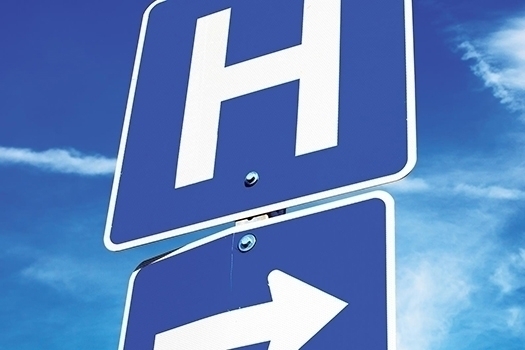‘Untouchable’ hospitals still rejecting ‘75%’ of GP referrals

Exclusive Hospitals rendered ‘untouchable’ by coronavirus measures are still rejecting referrals and ‘reverse delegating’ patients back to their GPs, Pulse has learned.
Pulse has been told that CCGs in some areas are having to hold around 75% of GP referrals, which are not being accepted by trusts.
GP leaders warned that the ‘backlog’ of patients waiting to be seen by secondary care is placing the ‘risk and burden’ on primary care.
It comes as the NHS Confederation said that 10 million patients could be on the waiting list for routine procedures by the end of this year.
North Staffs LMC secretary and BMA GP Committee policy lead on NHS England Dr Chandra Kanneganti told Pulse that where referral systems are switched on, CCGs are storing referrals and ‘negotiating’ to release them ‘a few at a time’ to the hospitals.
He said: ‘The message from CCGs to us is that they have transferred around 1,100 referrals to the trust – around 24% of the backlog.’
However, he added that ‘most’ specialties still have not switched on their e-referral systems, meaning GPs are not able to refer to them at all.
North Staffs LMC chair Dr Paul Scott said: ‘Because of the Covid measures, the hospitals have become completely untouchable and uncontrollable by the CCGs. They are being their own judge, jury and executioners and they can say how much or how little they do.’
He added: ‘That might have been appropriate in April and possibly May, but it is certainly not appropriate in June.’
There are ‘mutterings’ that CCGs may be unable to pass routine referrals on to trusts until October, or July ‘at least’, Dr Scott added.
Meanwhile, he told Pulse that there is also ‘some considerable reverse delegation on GPs’, with patients who deteriorate while waiting to be seen by secondary care either directly contacting their practice or being told by hospitals to return to their GP and ask for an urgent referral.
Dr Scott said: ‘It’s actually just expediting them up a list that’s still stuck. [And] even though they say they’ve begun to restart doing the list, the list is still growing.’
He added: ‘We’re told that a lot of the specialty waiting lists are already more than a year now. And that’s in a situation where the majority of patients aren’t even asking to be referred.’
Practices are left facing ‘risk and burden’ as a result of the ‘thousands’ of scans and outpatient appointments waiting to be done, Dr Kanneganti added.
He said: ‘It’s causing too much stress and anxiety to GP colleagues and to their patients as well.
‘It’s going to be this kind of risk going on for the next year or two because there’s a backlog of so many referrals waiting.’
Hospitals have been given a block contract until October due to the pandemic, meaning they will still receive payment whether or not they see patients, he added.
It comes as an NHS Confederation report published this week found that dealing with the backlog of paused treatments will be a ‘key challenge’ facing the NHS recovery from Covid-19.
It suggested that the NHS waiting list for routine procedures – which currently stands at more than four million patients – could reach 10 million by the end of the year or possibly higher if there is a second wave and no treatment or vaccine available.
The report warned that while primary care will ‘play a vital role in the continued rehabilitation’ of coronavirus patients, both funding and access to specialist advice will be needed.
It said: ‘At present, many PCNs are overseeing a “gold standard” Covid-19 response, including strict use of “hot and cold” sites for patients. It is simply not possible to retain this gold standard as well as increase consultations for non-Covid-19 patients and address backlogs.
‘Either additional resources and funding are needed, or something has to give.’
The BMA last week called for the Government to outline a ‘credible plan’ for addressing the ‘huge’ backlog.
BMA council chair Dr Chaand Nagpaul said: ‘The Government must be honest with the public about the surge to come and start meaningful conversations with frontline clinicians about how we can, together, begin to tackle the backlog.
‘This will require transparency around capacity and the workforce crisis, and the need to invest in infrastructure that can meet the healthcare needs of patients.’
Meanwhile, the Medical Protection Society also called for ‘urgent action’ from the Government to avoid a ‘tsunami’ of claims and investigations arising from the delays to care.
This week, official data revealed that the number of urgent cancer referrals made by GPs in April declined by 60% year on year.
And earlier this month, Pulse revealed that almost three-quarters of GPs say they have been managing more patients ‘outside their comfort zone’ due to less support from secondary care during the Covid-19 pandemic.
Visit Pulse Reference for details on 140 symptoms, including easily searchable symptoms and categories, offering you a free platform to check symptoms and receive potential diagnoses during consultations.



 Oviva’s fully remote Tier 3 Weight Management programme
Oviva’s fully remote Tier 3 Weight Management programme





